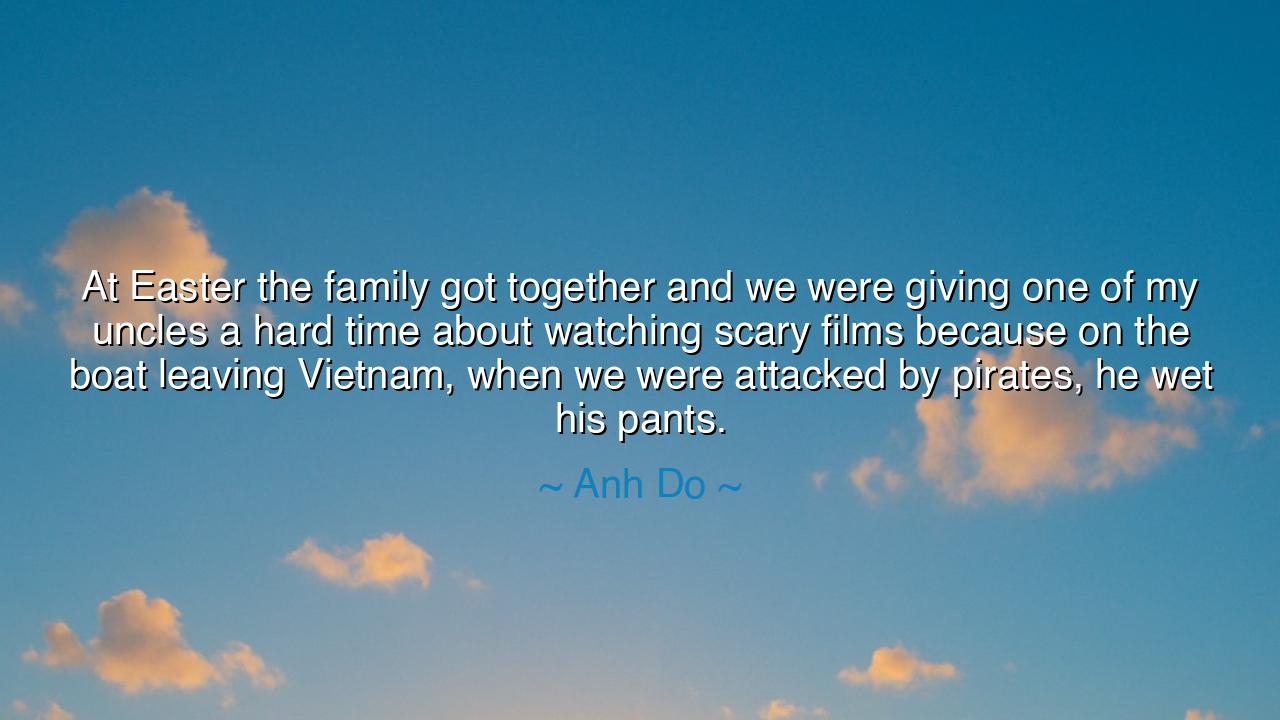
At Easter the family got together and we were giving one of my
At Easter the family got together and we were giving one of my uncles a hard time about watching scary films because on the boat leaving Vietnam, when we were attacked by pirates, he wet his pants.






In this humble yet profound reflection, Anh Do speaks not only of family, fear, and memory, but of the fragile thread that connects trauma and laughter — the way human beings transform suffering into story, and story into strength. “At Easter the family got together and we were giving one of my uncles a hard time about watching scary films because on the boat leaving Vietnam, when we were attacked by pirates, he wet his pants.” At first glance, it seems a tale of humor shared among kin, but beneath its lighthearted tone lies a deep truth: that those who have survived darkness learn, in time, to laugh at it, not because it was trivial, but because laughter is the final triumph of the spirit over fear.
To understand the origin of this quote, one must remember the life of Anh Do, the Vietnamese-born Australian comedian, author, and actor whose family fled Vietnam by boat after the fall of Saigon. Their voyage was one of peril, a desperate escape from a homeland consumed by war. Like thousands of refugees, they faced storms, hunger, and — as in this story — pirates who preyed upon the weak. That his uncle, a man of courage, “wet his pants” in terror is not a mark of shame, but of humanity. Yet the family, gathered years later in peace and laughter, retells this once-horrific moment as a source of affection and comedy. Through that retelling, the pain of the past is not erased but transformed. This is the ancient art of healing through story — turning wounds into wisdom, fear into resilience.
In the style of the ancients, we would say: this is not merely a family anecdote, but a parable of remembrance and redemption. When the family gathers at Easter, a time already rich with symbols of death and resurrection, they unconsciously mirror the greater story of renewal. What was once terror on the open sea has become laughter around the table. What was once a nightmare has become a shared legend that unites them. Just as the early Christians saw in resurrection the triumph of life over death, so too does this family’s laughter proclaim that they have risen from the waters of fear into the dry land of freedom.
There is also in Anh Do’s quote a lesson in perspective — that time can soften even the harshest storms. The pirates, the danger, the trembling — all were once unbearable. Yet years later, those same moments become the soil from which gratitude grows. The family can tease, not because they have forgotten, but because they have survived. It is the same transformation that survivors across history have known. Think of Viktor Frankl, the psychologist who endured the Nazi concentration camps and wrote Man’s Search for Meaning. He taught that those who could find meaning in suffering — even humor — were the ones most likely to endure. To laugh in the face of fear, he said, is to affirm that one’s spirit remains unconquered.
But this quote also reminds us of the sacred bond of family, the circle within which even pain becomes a form of love. The teasing at Easter is not cruelty, but tenderness disguised as jest. In every family that has endured hardship — be it exile, poverty, or loss — laughter becomes a kind of language, a way to say, “We are safe now. We are together. We can bear to remember.” The ancients would have recognized this as the virtue of catharsis — the cleansing of the heart through shared emotion. What cannot be undone can still be retold, and in the telling, peace is restored.
The meaning of Anh Do’s story, then, reaches beyond his family and touches all who have faced the storms of life. Whether those storms are of war or of the heart, they leave behind fear. Yet time, courage, and community can turn even the darkest memory into a story that strengthens rather than shames us. To be able to laugh at our past is to have conquered it. As the philosopher Seneca wrote, “What once was our burden, when borne well, becomes our glory.” The uncle who once trembled at the sight of pirates now lives on as a symbol of both fear and fortitude — a reminder that being human means being vulnerable, and that vulnerability, when accepted, becomes the root of compassion.
The lesson we may draw from this is timeless: do not flee from your fear — transform it. Remember your past, but let it ripen into gratitude. Gather with those who share your scars, and laugh, not to mock the pain, but to honor the fact that you survived it. Each story of hardship, told with warmth and humor, becomes an offering to the future — a promise that fear need not have the final word. And so, when Anh Do and his family laugh at that Easter table, they are doing what all wise souls eventually learn to do: turning tragedy into triumph, memory into meaning, and survival into song.
Thus, let the words of Anh Do remind us all that healing often begins not in solemn silence, but in laughter — the laughter of those who have crossed the seas of fear and now sit together on the solid shores of peace. For laughter, born of survival, is the sound of resurrection; and every time we share it, we affirm the oldest truth known to humankind — that the spirit is stronger than the storm.






AAdministratorAdministrator
Welcome, honored guests. Please leave a comment, we will respond soon